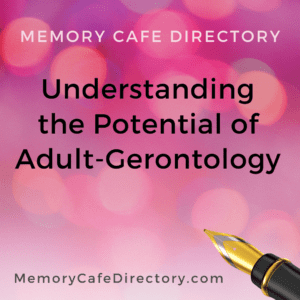Memory Cafe Directory posts and/or links to retailers can be advertising, sponsored, or affiliate links. We may earn a small commission from them. Thank you.
The world is undergoing a significant demographic shift as the number of older adults steadily rises. According to the World Health Organization, by the year 2050, the global population of individuals aged 60 and above is projected to double, reaching an estimated 2.1 billion. Simultaneously, the number of people aged 80 years or older is anticipated to triple between 2020 and 2050, reaching an astonishing 426 million individuals.
This demographic transformation has led to an increased demand for specialized healthcare professionals who can cater to the unique needs of the aging population. This is where adult gerontology specialists play a crucial role, providing specialized care and expertise to promote the well-being and quality of life for older adults.
This field can be a very rewarding avenue to pursue for many in the Memory Cafe Directory community. You might:
- be a family caregiver whose caregiving responsibilities have ended or will end soon.
- have a passion for supporting those living with dementia – whether they be family or not.
- be a professional looking for a very specific specialization.
In this article, we will delve into the growing demand for adult gerontology specialists and explore why pursuing a degree in adult gerontology can be a smart career move.
Understanding Adult-Gerontology
Adult gerontology is a multidisciplinary field that focuses on the healthcare and well-being of adults and older adults. It encompasses various specialties, such as geriatric nursing, geriatric social work, geriatric medicine, and more.
Wilkes University notes that adult gerontology specialists possess an in-depth understanding of the physiological, psychological, and social aspects of aging, enabling them to provide comprehensive and specialized care to older adults.
However, the current number of certified geriatricians practicing in the United States is a concern, with only 7,029 professionals available. This figure falls significantly short of meeting the increasing demand for geriatric care. To adequately address the needs of the aging population, it is essential to take measures to expand the geriatric workforce.
Fortunately, obtaining an adult gerontology degree online has become a valuable solution to meet the increasing demand for specialists in this field. Designed specifically for registered nurses, these online programs offer a Master of Science in Nursing (MSN) with a focus on adult-gerontology.
The flexibility of remote learning enables individuals from diverse backgrounds and locations to access specialized education and training. With comprehensive curricula, interactive platforms, and opportunities for practical experiences, these programs equip nurses with the skills and knowledge necessary to excel in adult-gerontology care.
This convenient and accessible approach bridges the gap and allows professionals to pursue advanced degrees without relocating or disrupting their work schedules, ultimately meeting the growing need for qualified adult gerontology specialists.
The Growing Demand
As the global population of individuals aged 60 and above continues to grow at an unprecedented rate, there is a pressing need for professionals who possess the knowledge and skills to provide comprehensive care to older adults.
Other key factors contributing to the growing demand are:
Health and Wellness
As people live longer, there is a growing emphasis on promoting healthy aging and enhancing the quality of life for older adults. This focus is supported by statistics from the Centers for Disease Control and Prevention (CDC) that highlight the relationship between age and the likelihood of hospital admission following emergency department (ED) visits.
The data demonstrates a clear trend: as age increases, so does the percentage of ED visits resulting in hospital admission. For instance, among patients aged 60-69, 19% of ED visits led to hospital admission. This percentage rises to 23% for patients aged 70-79, further increasing to 30% for those aged 80-89. Notably, for patients aged 90 and over, a substantial 33% of ED visits resulted in hospital admission.
These statistics emphasize the importance of adult gerontology specialists who can address the unique healthcare needs of older adults. This includes managing chronic conditions, preventing age-related diseases, and providing comprehensive care that promotes physical, mental, and emotional well-being.
Specialized Expertise
The complexities associated with aging highlight the need for healthcare professionals with specialized knowledge and skills. Employers in diverse healthcare settings, including hospitals, long-term care facilities, and community health centers, are increasingly recognizing the significance of adult gerontology specialists.
This recognition stems from the fact that approximately 80% of individuals aged 65 and above live with at least one chronic condition, while approximately 68% are affected by two or more chronic conditions.
These statistics underscore the importance of adult gerontology specialists. They are needed to develop and implement personalized care plans, conduct comprehensive assessments, coordinate smooth care transitions, and offer valuable guidance to patients and their families.
Policy and Research
The field of adult gerontology is not limited to clinical practice alone. It extends to research, policy development, and advocacy. Adult gerontology specialists contribute to the development of evidence-based practices, shape policies that address the needs of older adults, and advocate for improved healthcare resources and services for this population. Their expertise is crucial in shaping the future of healthcare for older adults.
Why Pursue a Degree in Adult-Gerontology?
Compelling reasons why pursuing a degree in adult gerontology is a smart career move:
Rewarding Career
A career in adult gerontology offers immense satisfaction and a sense of purpose. The opportunity to make a positive impact on the lives of older adults and contribute to their well-being is highly rewarding. As an adult gerontology specialist, you become an advocate for healthy aging and a trusted healthcare professional for older adults and their families.
Job Security and Growth
The demand for adult gerontology specialists is poised to undergo a substantial increase in the upcoming years. By pursuing a degree in adult gerontology, you position yourself for long-term job security and a multitude of growth opportunities.
The healthcare industry, as highlighted by the Bureau of Labor Statistics (BLS), is projected to witness the highest employment growth rate among all occupational categories in the United States from 2019 to 2029. Moreover, recent data from the BLS showcases that individuals with a gerontology degree who work as administrative service managers earn an average annual salary of $98,890.
These figures underscore the significance of specialized care for older adults and indicate a consistent demand for professionals with expertise in adult gerontology. As a result, pursuing a degree in this field offers a promising future, with job opportunities expected to grow by 9% through 2030.
Diverse Career Pathways
A degree in adult gerontology opens doors to a variety of career pathways. Graduates can work in hospitals, nursing homes, home healthcare agencies, community health centers, research institutions, and even in policy development and advocacy roles. The versatility of the field allows you to explore diverse settings and find a career path that aligns with your interests and goals.
Personal and Professional Development
Pursuing a degree in adult gerontology offers ample opportunities for personal and professional growth. You gain knowledge and skills that enable you to provide specialized care, develop leadership abilities, enhance critical thinking and problem-solving skills, and stay updated with the latest advancements in geriatric healthcare. This continuous growth fosters a fulfilling and dynamic career.
Getting Started on a New Career Path
The growing demand for adult gerontology specialists is a direct result of the aging population and the need for specialized care and support for older adults. Pursuing a degree in adult gerontology is a smart career move that opens doors to a rewarding and fulfilling career.
By choosing this path, you can make a meaningful difference in the lives of older adults, contribute to the field of geriatric healthcare, and secure a promising future in a growing and dynamic industry.






